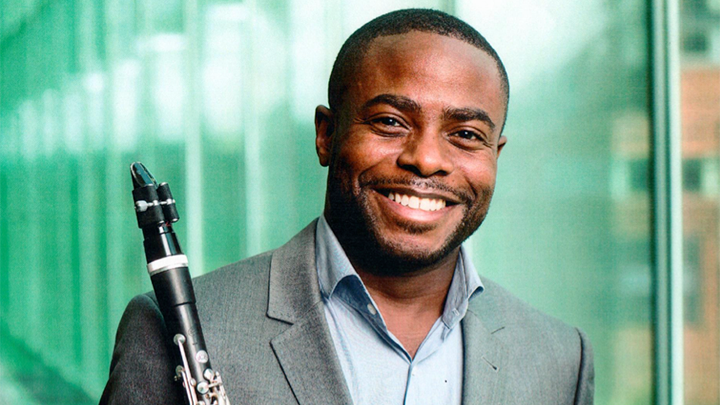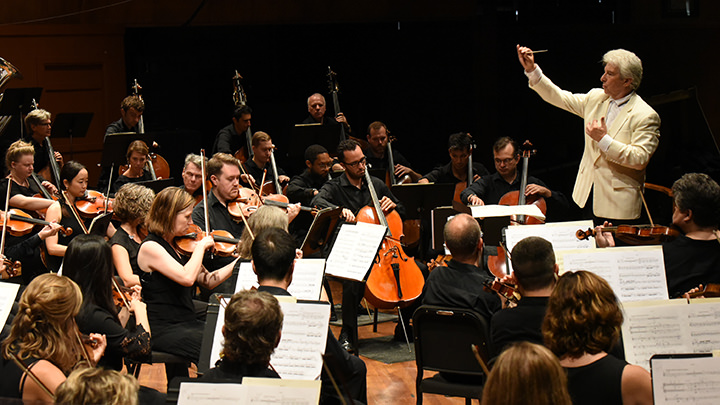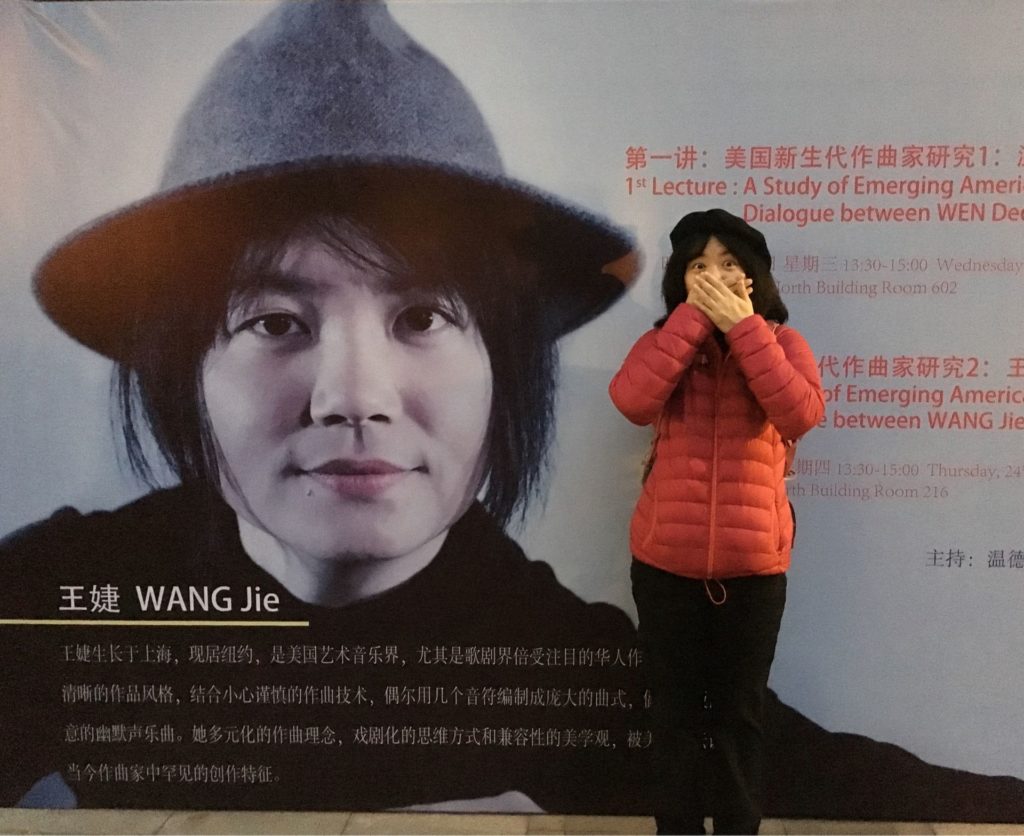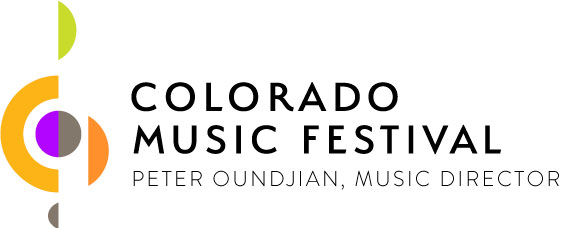story by Natalie Clare
The acclaimed Anthony McGill, principal clarinetist for the New York Philharmonic, makes his mark on Chautauqua Auditorium on August 4. McGill will bring to life Carl Maria von Weber’s First Clarinet Concerto and Première Rhapsodie by Claude Debussy. The orchestral centerpiece of the show is Igor Stravinsky’s Firebird Suite — an exciting and dramatic musical fairytale drawn from generations of folklore.
Preceding McGill is a thrilling new overture, and Colorado Music Festival commission, by Chinese composer Wang Jie. The virtuosic Jie weaves a musical program inspired by a 12th-century poem which was written by celebrated poet-writer-artist Su Dongpo. It combines the artistry of Dongpo’s ode to the beauty of mountainous earth with Jie’s own passion for rock climbing.
Learn about this fantastical evening of music below!

More About Anthony McGill
Anthony McGill made history with the New York Philharmonic.
McGill joined the world-renowned symphony orchestra in 2014. He’s the first African-American principal clarinet in the orchestra’s 180-year history. Prior to this achievement, he performed as principal clarinet for the Metropolitan Opera and as associate principal clarinet of the Cincinnati Symphony Orchestra.
He was awarded the esteemed Avery Fisher Prize in 2020.
Administered by the world-renowned Lincoln Center for the Performing arts, the Avery Fisher Prize is one of the most significant awards given to classical musicians. It recognizes those “who represent the highest level of excellence and whose vision and leadership have expanded the reach of classical music.” Previous Avery Fisher Prize winners include such musical artists as Murray Perahia, Yo-Yo Ma, Emanuel Ax, André Watts, Midori, Emerson String Quartet, and others.
Musical talent runs in the family.
Anthony McGill was inspired to pursue clarinet during his childhood after watching his brother, Demarre McGill, play flute. Demarre McGill is principal flutist for the Seattle Symphony, preceded by the same position at the Dallas Symphony Orchestra and his position as Acting principal flute at the Metropolitan Opera Orchestra. The brothers recorded the albums Winged Creatures and Portraits together.
Anthony McGill is supporting rising classical music stars.
As described in his artistic biography, McGill graduated from the Curtis Institute of Music, where he’s currently the William R. and Hyunah Yu Brody Distinguished Chair. He also serves as the Artistic Director of Juilliard’s Music Advancement Program (MAP), which trains students from diverse backgrounds on classical music. Guided by philanthropy, McGill co-founded the Weston Sprott and Anthony McGill MAP Summer Scholarship Fund in 2020. Last year, the Fund received a permanent endowment grant of $50 million to continue supporting musical students in underserved communities.
You may have seen Anthony McGill’s viral video of “America the Beautiful.”
In response to the death of George Floyd in May 2020, McGill published a video on Facebook in which he played “America the Beautiful” on clarinet and ended his performance by bending both knees, a gesture towards Colin Kaepernick’s silent act of protest. The video was shared widely online, NPR wrote, and it inspired similar video responses, including a somber solo performance of “The Star-Spangled Banner” by Billy Hunter, principal trumpet with the Metropolitan Opera.
He views art as a way to imagine a better future.
In a 2021 interview, the Poetry Society of America asked McGill, “What do you see as the role of art in public life at this moment in time?” He responded, “I see the role of art as a reminder of our shared humanity and capacity for love and kindness. Art shows us that we can progress together and unite around values of dignity and respect for our differences. It is a medium through which ideas that change the world are delivered. Humanity slowly evolves through self-critique, examination, and expression delivered by artist messengers. Art has the power to describe our present situation, examine the mistakes of our past, and imagine a better future.”

Magic, Love, and Renewal: Stravinsky’s Firebird
The story follows the lead of beloved fairy tales.
With roots in Slavic folklore, the Firebird is a beautiful bird with golden feathers. If someone finds one of its feathers, it foretells a difficult journey for them. The tale at the center of Stravinsky’s Firebird follows a young prince who finds a golden feather and sets about to free a group of spellbound maidens from the clutches of an evil sorcerer. He falls in love with one of the maidens, and with the help of the Firebird’s magical feather, he breaks the spell and defeats the sorcerer.
Firebird was composed by Igor Stravinsky in 1909.
It’s regarded that Stravinsky’s creation arrived somewhat fatefully. Stravinsky was 27 years old when he was approached by Sergei Diaghilev, who was founder of the Ballets Russes in Paris. Diaghilev needed a composition for a ballet, and he’d already approached four other well-regarded Russian composers — Nikolai Tcherepnin, Anatoly Liadov, Alexander Glazunov and Nikolai Sokolov. None of them accepted the offer, which paved the way for Stravinsky to make his major break. The ballet made its debut in June 1910, and its critical acclaim launched the composer into fast success. Stravinsky was later commissioned by Diaghilev to compose the ballets Petrushka in 1911 and the Rite of Spring in 1913.
Firebird started as a ballet but Stravinsky reimagined it for concert performance.
In the years that followed the ballet’s debut, Stravinsky created three different suites from its score in the years 1911, 1919, and 1945. The 1919 suite consists of five movements, and it’s the suite which will be featured in this program’s performance. Lush musical details reflect the story and characters in evocative ways: low strings for the evil sorcerer, woodwinds and strings for the Firebird and the maidens, brass for dramatic and climactic action, and strings accompanied by the horn for the conclusion.
It embodies both the Romantic and 20th-Century musical eras.
Firebird premiered during a transitional period, and as such, its musical features reflect that time. It embodies the expressive and dramatic characteristics of the Romantic period, which produced such composers as Frederic Chopin, Felix Mendelssohn, and Peter Ilyich Tchaikovsky, to name a few. It also features the free and experimental spirit of 20th-Century classical music, which was defined by composers like Claude Debussy, Maurice Ravel, Gustav Holst, and Arnold Schoenberg, among others.

Wang Jie’s Journey to the Mountain
The world premiere is inspired by a 12th-century poem about a mountain.
Su Dongpo was a prolific Chinese writer-artist of the Song Dynasty. He was also a celebrated statesman, calligrapher, and pharmacologist, and by Jie’s own description of him, he was a notoriously strong personality. A portion of Dongpo’s poem at the center of Jie’s inspiration reads:
“The true face of Mount Lu is lost to my sight, For it is right in this
mountain that I reside.
Our spirit resides at the summit,
For it is the only place that we fly,
On the scaly backs of our mountains.
The truth unleashes from the sky.”
In her world premiere composition, Jie marries Dongpo’s beautifully etched poetry with her own passion for rock climbing and mountaineering. In this way, she creates a fresh and imaginative musical letter to the natural world and the greater universe.
The composition reflects Wang Jie’s creatively brilliant musical approach.
Like Dongpo, who was singular and legendary in his own right, Jie is a prolific and creative storyteller. Her artistic biography says, “part cartoon character, part virtuoso, composer Wang Jie has spent the last two decades nudging classical music and its concert audiences into spectacular frontiers.”
Critical praise of Wang Jie’s work promises a colorful and charming evening of music.
Known as a piano prodigy by age 5 and raised within the influential environment of China’s Cultural Revolution, Jie pursued music passionately as a child before training at Manhattan School of Music and the Curtis Institute of Music in New York. She has since received heaps of critical praise. In 2011, the New York Concert Review wrote about “A Longing for Spring, A Multi-language Song Cycle”: “There are so many ways to appreciate this composition, through sight, sound, and meaning, that interest never lapsed.” The New York Times called her chamber opera “From the Other Sky” “vibrant” and “polished,” while Classicalsource.com wrote that it’s “far more fun than one is supposed to have a concert of ‘serious’ music.”
Likewise, Jie’s contemporaries have praised her innovative musical art. Conductor Joann Falletta remarked, “Wang Jie is a unique and complex voice, combining a fierce intelligence with a vulnerable beauty in orchestral music that virtually shimmers with color.” Composer Derek Bermel called her “a musician with a great sense of humor and natural theatrical flair.” And violinist Inmo Yang said, “Working with Jie was like observing the formation of a glorious rainbow. No matter how heavy the fog, her music finds its way to a radiant smile.”
With seminal works of beloved music and unparalleled talent in clarinetist Anthony McGill and composer Wang Jie, Colorado Music Festival audiences can look forward to an imaginative evening with iconic music and creative musical storytelling.
Don’t miss this concert featuring clarinetist Anthony McGill, a world premiere by composer Wang Jie, and Stravinsky’s iconic Firebird.
